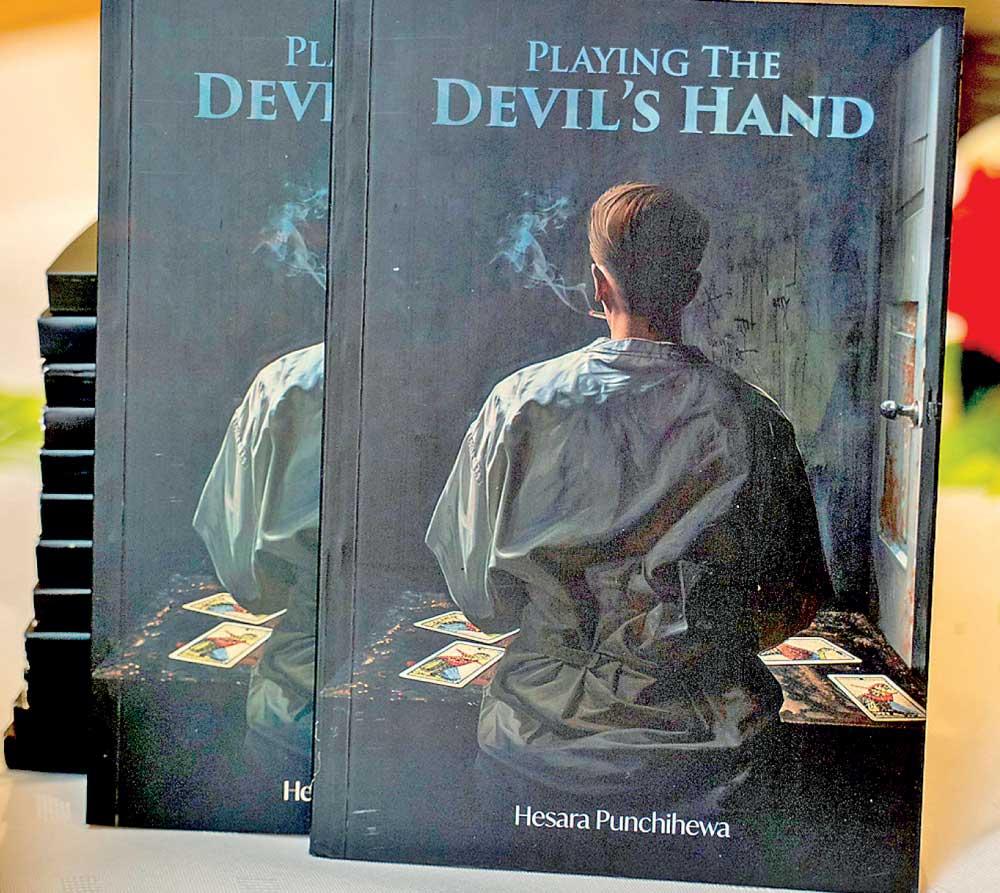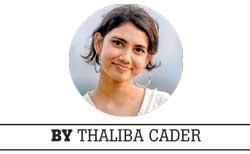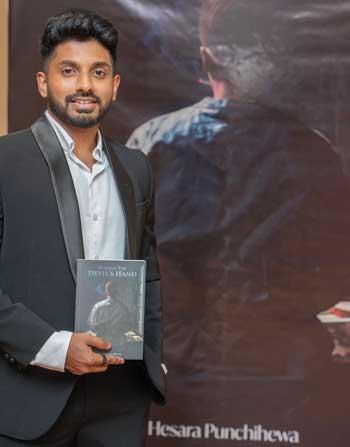16 Nov 2024 - {{hitsCtrl.values.hits}}

 In the kaleidoscope of life, airports emerge as paradoxical sanctuaries, where the universe brings us together, only to leave us profoundly alone. Playing the Devil’s Hand by Hesara Punchihewa is not just a narrative; it’s an invitation to explore the complexities of identity, mental health, and the delicate intersections of culture. The novel opens in Istanbul, capturing the beauty of airports as places where “the universe’s sadistic, paradoxical way of bringing people together” unfolds. This line frames the novel’s exploration of irony in human connection - how, even in moments of closeness, we often grapple with solitude.
In the kaleidoscope of life, airports emerge as paradoxical sanctuaries, where the universe brings us together, only to leave us profoundly alone. Playing the Devil’s Hand by Hesara Punchihewa is not just a narrative; it’s an invitation to explore the complexities of identity, mental health, and the delicate intersections of culture. The novel opens in Istanbul, capturing the beauty of airports as places where “the universe’s sadistic, paradoxical way of bringing people together” unfolds. This line frames the novel’s exploration of irony in human connection - how, even in moments of closeness, we often grapple with solitude.
His prose resonates with Aksel’s inner world as he navigates foreign landscapes that reflect his sense of displacement. Aksel’s reflection on life’s predictability, contemplating “the glistening spark that once tenanted his eyes” now replaced by “the heavy burden of a barren man lost within himself,’ expresses the emptiness he feels. This universal sentiment is powerfully conveyed through Punchihewa’s writing.
 Punchihewa’s treatment of cultural authenticity is notable, His exploration of Aksel’s Danish identity, framed through encounters with Turkish and Sri Lankan cultures, examines how we find, and sometimes lose ourselves in unfamiliar worlds. Aksel’s journey is not merely physical but metaphysical, confronting his role in “fixing” others while realizing that it’s his own inner life that may need mending. This irony deepens with cultural symbols like the Turkish Evil Eye, which serves as a metaphor for self-protection against unseen threats, sometimes at the cost of vulnerability and genuine connection.
Punchihewa’s treatment of cultural authenticity is notable, His exploration of Aksel’s Danish identity, framed through encounters with Turkish and Sri Lankan cultures, examines how we find, and sometimes lose ourselves in unfamiliar worlds. Aksel’s journey is not merely physical but metaphysical, confronting his role in “fixing” others while realizing that it’s his own inner life that may need mending. This irony deepens with cultural symbols like the Turkish Evil Eye, which serves as a metaphor for self-protection against unseen threats, sometimes at the cost of vulnerability and genuine connection.
In a Q&A, Punchihewa reveals his commitment to addressing mental health with depth, stating, “Depression is invisible. It has no colour, no smell, no texture. And this allows it to easily seep into our day-to-day lives.” His words capture the spirit of the novel, as Aksel’s silent struggles with purpose and identity resonate with this nuanced portrayal of mental health. Punchihewa’s storytelling probes deep into the human psyche, illuminating the dark spaces many fear to confront.
Reflections with the Author of Playing the Devil’s Hand
You started writing at a young age, with your first attempt at 12. How has your approach to storytelling evolved since then, especially now with ‘Playing the Devil’s Hand’?
Yes, writing has most certainly been a constant part of my life for a long time now. I was a keen reader from a young age, and this, I believe, in turn made me want to have my own novel out in the world one day. As a little kid who was mesmerized and inspired in the likes of brilliant minds like JK Rowling, Charles Dickens and Louisa May Alcott, this was my undying dream. My first attempt at a completed manuscript was at the age of 12. Since then, I’ve had several failed attempts at getting my first novel published. I was never much of a technologically advanced person, I’m still not, and hence, I found myself handwriting these manuscripts on exercise books. This process, of course, took so much more time than our traditional way of typing the manuscript on a software. With time, after several of these failed attempts, my first novel ‘A LIE OF A LIFE’ gets published in the year 2020, at the age of 21. This was my first real significant win, in terms of my career as an author. I believe my writing has definitely taken a turn since my first publication. With a lot of material from my own personal experiences now being incorporated into my work, it has transcended on its own.
After all, I do believe that every character, and every story, created by a writer is in fact put together with bits and pieces of the writer himself.
What inspired you to write “Playing the Devil’s Hand”? Was there a particular event or experience that sparked the idea for this book?
To be purely candid in my answer, I would say that unlike with my previous novel, the inspiration for ‘Playing the Devil’s Hand’ never came from one clear-cut source of inspiration, or from one particular incident or person. The core purpose of this creation was to address a collection of stigmatized notions and social grey-spots that had been crying out to be addressed for a long while now. This novel is an attempt at bringing to light a handful of less- spoken social and psychological issues that revolve around mental disease, intercultural interactions, Sri Lankan culture and the tourism culture in Sri Lanka.
Pursuing an MBBS degree while being a published author must be challenging. How do you balance the demanding nature of medical school with your passion for writing?
This is a question that I’ve been asked quite frequently in the recent past. As stressful and as hectic as it is, I would say that balancing my writing along with my medical career has in fact been one of the things that I enjoy the most! Yes, it can be a little overwhelming at times, and yes, I’ve had my fair share of bad days. But when managed right, there always seems to be enough time within my day for what I love. It was hard at first, I should say. But I’ve come up with this little technique to keep up with my consistency when working. I have allocated this specific window of time each day, where I just sit in my writing corner. That time, every day, I sit there, and I allocate purely for my writing. It doesn’t always work. In fact, during the first bits of the story, it rarely works. But the trick is to not get up until that allocated window of time has closed. There are days where I just sit there, having nothing on my mind and nothing on my manuscript. But I still don’t get up. And I’ve learned to practice this every day until the book that I’m working on has been completed. This little trick has worked miracles for me in my career as a writer, as well as a medical student.
Your Danish friend, Silke Ulvenberg, contributed insights into Danish culture for the book. How important is cultural authenticity in your writing, and how do you approach incorporating different cultural perspectives?
Extremely important, I would say. Cultural authenticity is one of the core elements of my work. I’ve always had a soft spot for foreign cultures - be it people, be it languages, be it food or be it art. I’ve always seen so much beauty in how different we all are from each other, and I’ve always wanted to reflect that beauty through my work for others to see the same. In this aspect, I’ve had heaps of help and support. Especially from my Belarusian friend Anya Viktharovna who played a constant, vital part of the support-system that brought my thoughts into words, words into paper, and into your hands today. Her input about Russian culture and the ways and traditions of the Slavic people was utterly crucial in building up the characters in this story. Having the reliable and unconditional support and input from someone who was physically by my side definitely helped bring out the best in my work. The input from my Danish friend Silke Ulvenburg, was no less impactful in the matter. In fact, the beginning of the story is based off some of my personal experiences with Silke, given that she and I, just like my main characters, met on a flight from Istanbul.
The protagonist Aksel Bjornsen is a Danish plastic surgeon. How much of your own experiences or the experiences of people you know influenced the creation of his character?
The character of Aksel Bjornsen, was solely a figment of my imagination. Aksel’s Danish background was built, as I said before, with the help of my Danish friend Silke Ulvenburg. His professional background as a surgeon, was of course nothing unfamiliar to me. The things I’ve seen in my medical career and the amazing surgeons that I’ve worked under, definitely made a huge impact in building up this controversial yet intriguing character. I’ve put a lot of thought and value into building this character. All in all, I would say, Aksel Bjornsen is the man that I hope never to be. He is my worst fear. He depicts the future I fear of ending up with.
The book touches on themes like mental health and personal struggle. Could you elaborate on why these themes are important to you and how you approached them in the story?
Having seen first-hand how much mental disease influences a person’s life, and how each person is affected very differently, it is no longer a matter that can go unnoticed within our social sphere. After having seen the circumstances in a medical perspective, I wouldn’t be wrong if I say that mental disease is the hardest of all diseases to diagnose, or even to recognize clinically. The lines are so vague that you often overlook them for something else, most often for something you might think is normal. That’s the reason why ‘Depression’, for example, has made such a colossal effect on our generation today. Depression is invisible. It has no colour, no smell, no texture. And this allows it to easily seep into our day-to-day lives. I believe that it is high time for our society to understand the gravity of mental disease and to give it the significance it requires, in order to tackle it on better terms. I have personally seen and experienced how much a person can silently suffer within this unending abyss. I have seen how lives can be completely uprooted and destroyed; all while no one was even ready to see that something was wrong. I hope my story left something out there for someone to make their life a little bit better.
What are some challenges you’ve faced as a young author, and how have you overcome them while still pursuing other interests like music and sports?
At the time when I wrote my first book, for a young Sri Lankan to try and publish an English novel on their own was a very far-fetched idea. Although it is now developing fast into a more comprehensive sector, English writing in Sri Lanka was a very unsupported and unnoticed aspect for a very long time. As for me personally, I never had anyone to really look up to as I began to make attempts at English writing. So much so, that during my first novel many years ago, I had no idea how the process of writing a book even works. Being the 16-year-old kid I was, I started off by handwriting the entire novel on three full notebooks. It was much later that I got accustomed to use computers and other devices to write. So yes, that lack of guidance always was a bit of a challenge that I’m now happy to have overcome.
Can you give us any hints about your next project? Are there other genres or themes you are eager to explore in the future?
Absolutely! My next project is already underway. I wouldn’t want to give anything away - I would be doing wrong to my readers if I spoil their curiosity in the least bit. It will, yet again, be something our society needs to hear more about.
Something my readers would love to get involved in. I’ve always tried to put in my best efforts to bring something new into my work, and hopefully I’ll continue to do so!
Hesara’s talent lies in his ability to convey universal human experiences with a maturity that is both introspective and empathetic. He captures life’s ambiguities by crafting a protagonist whose metaphorical and literal journey compels readers to confront their own.
His skill in weaving complex themes into accessible prose, coupled with his cultural sensitivity, sets him apart as a unique and impactful voice in contemporary literature. As we finish the book, Hesara leaves us with a thought-provoking question: in a world of fleeting connections and hidden struggles, how do we nurture the fragile threads of our identity while seeking genuine connections with others? Engaging with this question honours the complexities of our humanity, reminding us that, like Aksel, we are all navigating the delicate balance between belonging and solitude, perpetually searching for that elusive glimmer of hope amidst the shadows.
25 Dec 2024 3 hours ago
25 Dec 2024 4 hours ago
25 Dec 2024 4 hours ago